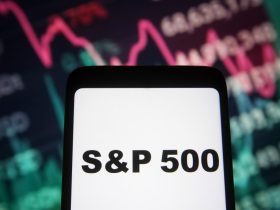U.S. stocks ended down Friday as investors worried about inflationary pressures ahead of the Federal Reserve’s meeting next week as well as an auto workers strike.
How stock indexes traded
-
The Dow Jones Industrial Average
DJIA
shed 288.87 points, or 0.8%, to close at 34,618.24. -
The S&P 500
SPX
fell 54.78 points, or 1.2%, to finish at 4,450.32. -
The Nasdaq Composite
COMP
dropped 217.72 points, or 1.6%, to end at 13,708.33.
For the week, the Dow rose 0.1%, while the S&P 500 dipped 0.2% and the technology-heavy Nasdaq declined 0.4%, according to Dow Jones Market Data. The S&P 500 and Nasdaq each booked a back-to-back weekly loss.
What drove markets
Inflation worries kept pressure on stocks as Treasury yields edged higher, while investors also expressed concern over the start of an auto worker strike.
“The picture of inflation continues to be difficult,” said Marco Pirondini, head of equities for Amundi U.S., in a phone interview Friday. “The market is starting to understand that the Fed will keep interest rates high for longer.”
The Federal Reserve, which has been tightening monetary policy in a bid to cool the economy and bring down the elevated cost of living in the U.S., will hold a policy meeting next week. Traders are expecting the central bank will keep its benchmark rate at the current target range of 5.25% to 5.5%.
The U.S. economy continues to be “fairly strong,” which makes it more difficult to bring down inflation, according to Pirondini. Fresh economic data on Friday came in stronger than anticipated for U.S. industrial output and manufacturing activity in New York state.
The Fed said Friday that industrial production in the U.S. rose 0.4% in August. That exceeded the 0.2% gain forecast by economists surveyed by The Wall Street Journal.
Meanwhile, the New York Fed released data from its Empire State manufacturing survey on Friday, with the business conditions index climbing to 1.9 this month. Economists polled by The Wall Street Journal had expected a negative reading on manufacturing activity in the state.
Investors were also monitoring the start of a strike of the United Auto Workers against the Big Three U.S. automakers, Ford Motor Co.
F,
General Motors Co.
GM,
and Chrysler owner Stellantis
STLA,
From a market perspective, the strike “doesn’t seem to be causing too much trouble if you look at the automakers,” said Randy Frederick, managing director of trading and derivatives at Charles Schwab, in a phone interview Friday. “It’s a nonevent at the moment,” he said, pointing to the rise Friday in shares of GM and Stellantis.
But the strike could become more of a problem for markets if it goes on for a long time, he said.
See: UAW strike stirs stock-market worries over corporate margins
Some analysts worry that the auto workers strike could drive up car prices, adding more fuel to inflationary pressures that have started to re-emerge over the summer while stoking fears about the impact on the broader U.S. economy.
A survey by the University of Michigan showed consumer sentiment falling in September for a second month in row. The survey also showed Americans think inflation will average 3.1% in the next year, down from expectations for 3.5% in the prior month and the lowest reading in two and a half years.
Meanwhile, rising Treasury yields have weighed on U.S. equities in recent weeks. The yield on the 10-year Treasury note
BX:TMUBMUSD10Y
climbed 3.2 basis points on Friday to 4.321%, according to Dow Jones Market Data.
Amid the uptick in rates, information technology was the worst-performing sector of the S&P 500, with a sharp drop of around 2%, according to FactSet data.
“Tech tends to be a pretty sensitive sector for interest rates,” said Frederick.
For the week, the S&P 500 index was little changed, slipping just 0.2%.
With the reporting of companies’ second-quarter earnings results “pretty much done,” there’s been a lack of major catalysts as this week’s economic data point to a U.S. economy that keeps holding up, according to Frederick.
“There’s just not a lot out there right now that’s terribly positive or terribly negative, which I think is why the market is kind of stuck in this sideways mode,” he said.
Companies in focus
-
General Motors Co.
GM,
+0.86%
shares rose 0.9% while Ford Motor Co.
F,
-0.08%
dipped 0.1% and Stellantis NV
STLA,
+2.18%
gained 1.9% after nearly 13,000 United Auto Workers at the three companies went on strike early Friday. -
ARM Holdings PLC‘s
ARM,
-4.47%
American depositary receipts ended 4.5% lower, dropping from their stunning market debut after closing Thursday 25% above their IPO listing price as execs see a big opportunity in saving chip makers money. -
Adobe Inc. shares
ADBE,
-4.21%
dropped 4.2% after the software company forecast revenue in line with Wall Street estimates and steady margins as it rolls out a paid version of its Firefly AI. -
Planet Fitness Inc.
PLNT,
-15.90%
shares tumbled 15.9% after the company announced the departure of CEO Chris Rondeau. -
Walt Disney Co.‘s
DIS,
+1.30%
stock rose 1.3% after a company representative said it hasn’t yet decided on what it will do with ABC and other broadcast channels that CEO Bob Iger has suggested could be sold.
Steve Goldstein contributed to this report.
Read the full article here











Leave a Reply